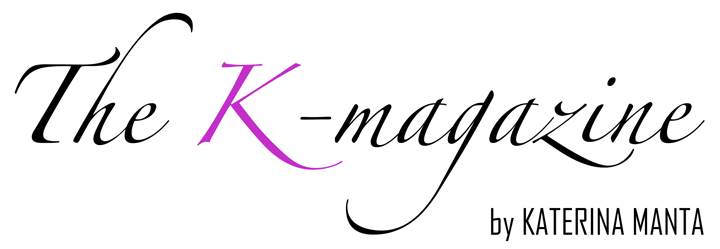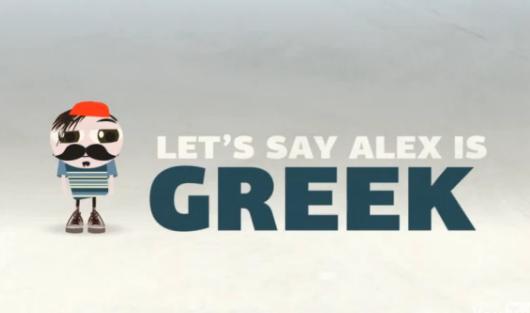Most of us have already watched a video circulating the internet, starring “Alex the Greek”. It’s a short animation that presents and critically examines some of the key stereotypes associated with the Greek economic crisis. In case you’re among those not already familiar with “Alex the Greek” have a look before you read on.
[vsw id=”ehsxIjeRaME” source=”youtube” width=”425″ height=”344″ autoplay=”no”]
Did you watch it? Good!
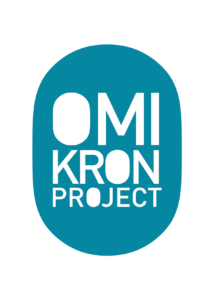 Personally I was fascinated by the fact that somebody was actively trying to address the image the rest of the world has about Greece’s affairs, and it was only natural to begin wondering who Omikron Project are. My search led me to Mehran Khalili, one of the co-founders of the group, who as I am sure you can guess is definitely not Greek! It would appear that Mehran is one of those rare people who want to try to put right what they see to be wrong. We scheduled a “Skype date” (hey! no naughty thoughts!) to have a chat about “Alex” and the rest of the projects the Omikron team have been working on since their launch in 2012. Despite the fact that technology played games with us (Skype not working properly), we managed to have a very interesting and enlightening conversation and I want to warmly thank Mehran for his patience.
Personally I was fascinated by the fact that somebody was actively trying to address the image the rest of the world has about Greece’s affairs, and it was only natural to begin wondering who Omikron Project are. My search led me to Mehran Khalili, one of the co-founders of the group, who as I am sure you can guess is definitely not Greek! It would appear that Mehran is one of those rare people who want to try to put right what they see to be wrong. We scheduled a “Skype date” (hey! no naughty thoughts!) to have a chat about “Alex” and the rest of the projects the Omikron team have been working on since their launch in 2012. Despite the fact that technology played games with us (Skype not working properly), we managed to have a very interesting and enlightening conversation and I want to warmly thank Mehran for his patience.
Antigone Adamopoulou (A.A.): So… what is “Omikron Project”? How did the idea come up in the first place?
Mehran Khalili (M.K.):OmikronProject is a grassroots campaign – a bunch of girls and guys trying to do something to address the international image problems faced by Greeks today, and tell some of the untold stories behind the headlines about Greece. We make creative productions – video, graphics, etc. – that are distributed online. There’s no company behind us, no money involved, no political affiliation… it’s entirely a volunteer project with a very simple and loose structure. It’s a bit like an art collective, to be honest.
A.A.: Since it’s mostly a volunteer project, how many people does the “Omikron” team consist of?
M.K.: In total there are about 40 people who have actively contributed to Omikron Project. But there’s a core of six or seven people now that are doing most of the work. Like any volunteer group, new people come in, people leave, old people come back, etc.
A.A.: So actually anyone who’s interested in the Project can join you.
M.K.: Yes. All they have to do is write to us at [email protected] . If they just want to be informed of our productions we’ll put them on our mailing list. But if someone wants to help with making the productions they can attend one of our meetings in Athens, which happen every week. We’re very open.
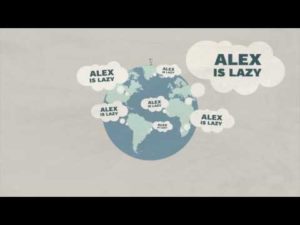 A.A.: That’s good. It makes it easier for people who are interested in the Project and want to contribute.
A.A.: That’s good. It makes it easier for people who are interested in the Project and want to contribute.
M.K.: Yes. Also, many people outside Athens, and outside Greece, want to help with Omikron Project, but we haven’t yet figured out the best way to involve them. It always works better if you sit around a table over a coffee. These people can always help with things like spreading the productions, but I understand some want to get much more involved. We’ll get there eventually.
A.A.: Well, it’s not necessary to get involved in the production. Volunteers can just spread the word or introduce some ideas.
M.K.: Yeah, that’s right. Ideas can come from anywhere. We monitor all the comments and mails we get and sometimes get ideas that way.
A.A.: Are there any non-Greek people who are involved? Are there volunteers with different nationalities, like you?
M.K.: To date, the majority of our members are Greek; at least 90%. There are a few French people, and some half-Greeks. It’s not surprising though, as our project is all about Greece and we’re based here.
A.A.: What I want to say is that it seems there’s an interest in the “Omikron Project” from non-Greek people. And that’s good!
M.K.: Yeah, we’ve had many emails from people outside Greece saying “I want to do something”. People from America, from Australia, Germany, Spain, people with no Greek roots… they’re fed up with the injustice they see with the Greek story and want to do something, anything, to help. We receive literally hundreds of emails since we started in March 2012.
A.A.: You live in Greece, you’re British–Iranian. What made you join the team? What (if any) are your relations with Greece?
M.K.: I’m one of the co-founders of the Project so I’ve been with it since the beginning. I’m married to a Greek and I love this country. But more importantly, I’m doing this because I see an injustice in front of my face every day: stories told about what’s happening here without context, without balance. Stories that make Greece seem like a 24/7 warzone, or a hellhole of poverty and despair, populated by corrupt, lazy people. These stories create a negative image that has serious consequences for Greeks today – economic and psychological – and that’s simply wrong. And when we see something wrong, we have to act.
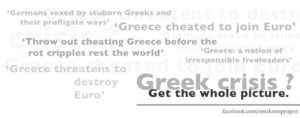 A.A.: That’s really nice, because unfortunately what I see as a Greek, is that Greek people are frustrated and angry with what’s happening, but still they’re idle. They won’t do a thing… I hope that will change pretty soon!
A.A.: That’s really nice, because unfortunately what I see as a Greek, is that Greek people are frustrated and angry with what’s happening, but still they’re idle. They won’t do a thing… I hope that will change pretty soon!
M.K.: It’s interesting that you say that. One of the productions we released in May was a map of all of the grassroots groups in Greece (we don’t only make videos!). We found about 240 groups of people stepping in where the system is failing. With no structure, with no money. Just ordinary people trying to address everyday problems.
As soon as we published our grassroots map we received tons of messages from people across Greece telling us about more groups in Thessaloniki, in Kefallonia, in Ioannina, and asking us to add them to our list. So in fact there really is a lot of stuff going on. It just doesn’t get much exposure; these groups don’t have a common place where they’re all counted.
A.A.: Obviously that’s the problem, so I’ll keep as the most important that your group can provide the space needed for these groups to be known.
M.K.: Yes. The map is trying to address that and we’ll update it again in September with all the edits and additions we received. It’s one way to help these groups get exposure… and to show the rest of the world that Greeks are not idle, not victims waiting to be helped.
A.A.: Let’s talk about “Alex the Greek”. How come he’s Greek? Couldn’t he be Irish, or Portuguese? Or even Italian? These countries are under the IMF’s control as well. So… why Greek?
M.K.: The Eurozone crisis story started with Greece; austerity hit other countries later. So the narrative that exists about Greece, and the stereotypes that have formed about its people, are much more solid than for other countries. And of course, we’re a Greek project – therefore Alex is Greek!
A.A.: How do your non-Greek fellows see “Alex the Greek”? Do they think that he’s really a “lazy bastard”, responsible for everything that he’s accused of?
M.K.: Back in 2009 when the crisis began, there was a wave of stories in international media that Greeks were lazy, corrupt, lived beyond their means and went bust and needed the help of nations with other, more responsible citizens. This became the established narrative.
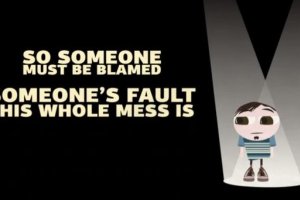 Today, four years on, the stories about Greece are typically about how much its people are suffering. Sadly, these stories are true… and they must be told. We’re not trying to sugar-coat anything here. But we believe these stories are not representative of the entire country, of the entire population. Not everyone in this country is starving, or going without medicine… thankfully, not yet! And on the contrary, many people are responding to social needs and systemic problems, as I mentioned, via grassroots groups and other initiatives. They are fighting back, non-violently, to improve the country. But these stories don’t get told because they’re not dramatic enough… and drama is what sells.
Today, four years on, the stories about Greece are typically about how much its people are suffering. Sadly, these stories are true… and they must be told. We’re not trying to sugar-coat anything here. But we believe these stories are not representative of the entire country, of the entire population. Not everyone in this country is starving, or going without medicine… thankfully, not yet! And on the contrary, many people are responding to social needs and systemic problems, as I mentioned, via grassroots groups and other initiatives. They are fighting back, non-violently, to improve the country. But these stories don’t get told because they’re not dramatic enough… and drama is what sells.
Now think about this. Imagine if one day I tell you “this person is lazy and corrupt and went bankrupt”. And the next, I tell you “now that same person is poor and suffering”. What connection would you make? You might feel sorry that he’s suffering, but you’ll say to yourself “well, he got what he deserved”.
This is a simplification, but it is how we believe the “crisis pornography” that defines Greek reporting actually reinforces the negative narrative about the country, gutting its tourism industry and driving its people further down. That’s what we’re trying to change with some of our productions like “Alex”.
A.A.: Are there any more videos in the pipeline? Can we expect Alex’s company to grow in size so as to include characters from other European countries, as you did in the second video with “Europa”? (note: you can watch the video here
M.K.: There will be more “Alex” videos. But these things take a lot of time to put together – we’re not going to put one out every month. If we did, people would soon get tired of us. They’ll be like “no, not another Alex video!”
A.A.: How do you view the role of social media in today’s news briefings?
M.K.: Social media has impacted every part of the news process. Journalists use it to research stories, find people for interview, etc. Then the stories are spread and commented on via social media. Sometimes they’re updated to reflect new facts that come in from social media. It’s changed the landscape for news completely.
What’s most interesting is that social media has opened up a space for people to become journalists themselves. Citizen journalism is increasingly popular in here Greece, giving people inside and outside the country news they otherwise wouldn’t have access to. Greece is unfortunately at the bottom of the EU press freedom rankings according to Reporters Without Borders, so a strong citizen journalism movement here is vital.
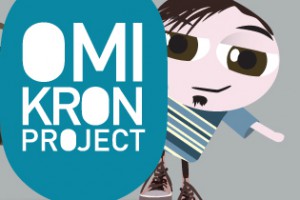 A.A.: Most people take as a fact that the media work in a manipulative way, in order to “suppress” people’s capacity to react. Do you believe that “Omikron Project’s” action can contribute in changing the way people receive and decode information?
A.A.: Most people take as a fact that the media work in a manipulative way, in order to “suppress” people’s capacity to react. Do you believe that “Omikron Project’s” action can contribute in changing the way people receive and decode information?
M.K.: I disagree that media work in a manipulative way by default. All journalism is advocacy in some form; it is pushing a point of view, which is as legitimate as yours or mine. That’s not necessarily manipulative; it’s just how the media landscape is.
The problem is that as news consumers we’ve forgotten this: we treat media as sources of objective facts, when we should really be more skeptical about everything we read, and consistently look for signs of bias in reports. Because we need information to take our decisions… and if that information is limited, it’s harder for us take the right decisions.
It’s up to us all to find different sources of information so we have as many sides of stories as we can. Unfortunately this often requires more work than people are willing to put in.
This is a global dynamic that will take a global effort to change. “Omikron Project” is trying to address it in our own small way by showing the other sides of the stories creatively so that people are both entertained and informed, without requiring too much of their time and attention.
If you find yourselves coming up with a brilliant idea that if communicated effectively can have a major positive impact, and affect change in a profound way, make sure you get in touch with the “Omikron” team simply by visiting the official website ( http://omikronproject.gr ). I know I will next time I’ll have that all important “light bulb” lighting up.
Αύριο η συνέντευξη θα δημοσιευτεί στα ελληνικά…
